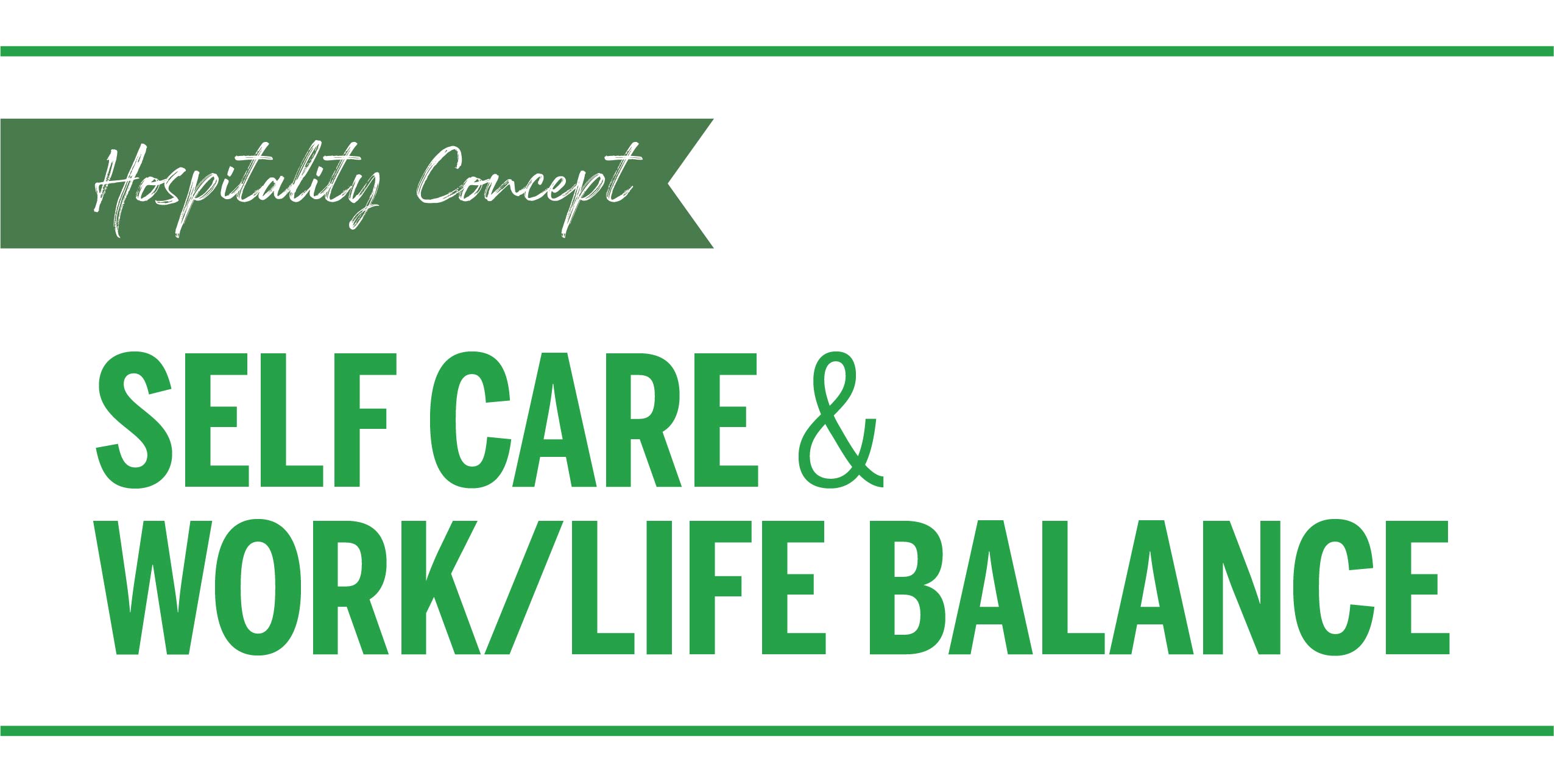13.15: Self Care and Work/Life Balance
- Page ID
- 11454

This section was written by Wendy Yost.
The Stakes are High
Insights gathered from over 240,000 employee interviews by the Work Institute cite Work/Life Balance as one of the top three reasons for leaving jobs in 2019. Further, the report states that over one-third of interviewees exited their organization within 365 days or less. Two out of three employees leaving in the first year, did so in the first six months. This proves to be an expensive problem for employers, given it is estimated to cost one-third of an employee’s salary to replace them. It also points to how employees are being taxed by applying and being selected for jobs that ultimately are not a good match. To better position yourself to assess fit for a particular position, company, or segment of the industry, consider the power of five critical conversations intentionally held before, during, and after securing any new position.
Critical Conversations in Support of Self Care and Work/Life Balance
1. Conversations with yourself
Take the time to reflect on what you enjoyed and what was problematic for you in past work-related experiences. Some possible questions to explore include:
- Would you most enjoy working inside or outside an office setting?
- Do you prefer managing transactions (seeing many different clients in a given day) or managing partnerships (working with the same people over time)?
- What characteristics do you desire in your direct supervisor?
- When you think about company cultures that would be a particularly good fit for you, what comes to mind?
While reflecting on these questions on your own is a good start, a next step that could prove even more useful is sharing your reflections with a representative from your college or university’s Career Center. Doing so will allow them to connect you with job search resources related to what you share, as well as assessment tools to get to the heart of what matters most to you personally and professionally, when it comes to the career possibilities you are exploring.
2. Conversations with those in positions similar to the ones you are seeking
Informational Interviews are one way for you to get a more thorough understanding of what it is like to work in a particular industry or for a particular company before you apply. This can save you a lot of time, stress, and heartache. Thirty minutes on the phone with someone in the role you are considering can be very clarifying when it comes to things like the lifestyle associated with a particular role, how much time is spent on different tasks and projects over the course of a typical day or week, and behind the scenes glimpses into a company’s culture. You can find professionals to conduct Informational Interviews by posting a request to social media asking who among your network can make an introduction to someone in the role, company, or industry segment you are interested in exploring. Another option is getting in touch with your campus Alumni Relations Office or faculty in the appropriate area of study and asking them to connect you with an alumnus who would be appropriate to interview. Typical questions for this kind of interview include:
- What kind of skills and personality traits are needed to succeed in your current role?
- Does your current role require any special training or certifications?
- Can you give me a sense of what a typical day looks like?
The main thing to remember is that you are not interviewing for a job, you are interviewing a person about their experience in a job. If they happen to ask you to send them your resume, do so. Yet regardless of any connections or opportunities they may or may not offer up, it is appropriate to send them a Thank You note appreciating the time they provided and insights they offered you.
3. Conversations with new supervisors
Anytime you start a new position, consider having a candid conversation with your supervisor about how you will be evaluated. Understanding any forms or processes your new company uses to conduct evaluations not only supports you in investing your time, energy, and attention in ways that align with what your company values, it can actually impact your wallet given the bonuses and other incentives some employers tie to performance. Yet often, employees don’t know how their performance is being measured until their first performance review, creating unnecessary stress. One way to open a conversation with your supervisor is to say something along the lines of, “I want to ensure that I am on target with the desired outcomes for my position. I was wondering if we could review the form or process that will be used to evaluate my work and if you could tell me when to expect my first evaluation”.
It is also possible, and even likely, that while your job may not change, your supervisor might. A smart approach to take when that happens is to brief your new boss on the following:
- Your resume (they did not hire you, so they may not have an accurate sense of your background, skills, and experience)
- A list of projects that you are currently working on
- A list of ideas that align with the mission of the company that you would like to work on
- Any upcoming challenges you anticipate that you want to ensure your new boss is aware of.
Most employees do not think to do this and end up at the mercy of their new supervisor, who is often overwhelmed with decisions to make. You can help smooth the transition for both of you, by being proactive and giving them the information they need to make decisions that support the work you most want to be doing under their leadership.
4. Conversations with colleagues outside your company
Developing and maintaining relationships with peers in other companies can be helpful in a number of ways. Having someone to talk to outside of your company allows you to better understand how different companies are managing industry trends, strengthens your network when it comes to future job opportunities, and provides a sounding board who isn’t mired in the same day to day operations as you but understands the basic functions of your role. When you have a rough day, they can commiserate because they understand the demands of the work being done. When you have a success to celebrate, they can join in, with an understanding of what it took for you to accomplish what you did. And all with a different degree of distance than your immediate colleagues, who may be too close to certain challenges or opportunities to be impartial with their listening or advice.
5. Conversations with mentors.
A mentor can help you regain perspective when you have lost it, see beyond what you can currently see, and help you process professional experiences in the context of the growth they have seen in you over time. Unlike peer-based conversations with colleagues outside your company, mentors serve a different capacity in supplementing your learning. For that reason, they don’t necessarily need to be older than you chronologically, just a bit further down the professional path in your industry of choice – or in terms of a particular skill set. At this point, it is not unusual to have intergenerational mentoring relationships, particularly related to the use of technology, where the mentor is actually younger in age than the mentee. Embrace the support that might be available in ways that are less obvious when it comes to mentoring relationships.

Photo by Body Bend Yoga on Nappy
Summing it Up
These conversations are important regardless of what industry or segment of an industry you choose to pursue a career in. Yet within hospitality, an industry known for exceptionally high turnover rates, they can be particularly important lifelines. Applying for positions that have a good likelihood of being a match for you, asking for what you need to be able to effectively meet the desired outcomes of your position, and creating a network of support are all ways that you can take care of yourself and strive to balance your work and life in healthy ways.
These conversations will also allow you to maintain perspective, while you tend to those who have lost theirs, something hospitality professionals are often called upon to do on a daily basis. Rather than being a statistic of high turnover, you can cultivate the skills and support that best serve you personally and professionally when it comes to meeting the demands of a particular job.
References
T. F. Mahan, D.A. Nelms, Y.Jeeun, A.Jackson, M.Hein, and R.Moffett, “2020 Retention Report: Trends, Reasons & Wake Up Call” Franklin, TN: Work Institute, 2020, https://workinstitute.com/retention-report/
Turnover intention in the hospitality industry: A meta-analysis, Jeongdoo Park, Hyounae (Kelly) Min, International Journal of Hospitality Management Volume 90, September 2020, 102599 https://www.sciencedirect.com/science/article/abs/pii/S0278431920301511

